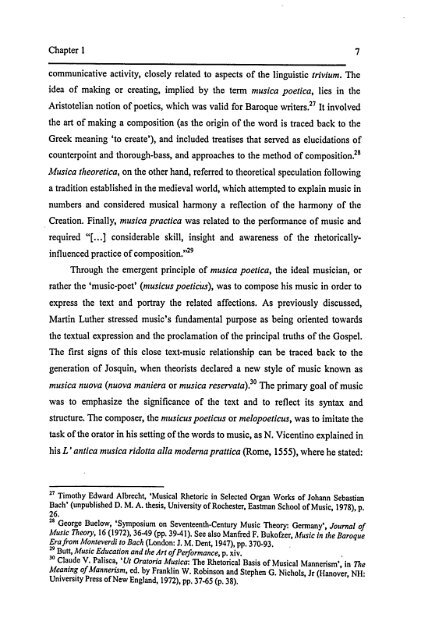27u8nYgqM
27u8nYgqM
27u8nYgqM
Create successful ePaper yourself
Turn your PDF publications into a flip-book with our unique Google optimized e-Paper software.
Chapter 17<br />
communicative activity, closely related to aspects of the linguistic trivium. The<br />
idea of making or creating, implied by the term musica poetica, lies in the<br />
Aristotelian notion of poetics, which was valid for Baroque writers. 7 It involved<br />
the art of making a composition (as the origin of the word is traced back to the<br />
Greek meaning `to create'), and included treatises that served as elucidations of<br />
counterpoint and thorough-bass, and approaches to the method of composition. 8<br />
Musica theoretica, on the other hand, referred to theoretical speculation following<br />
a tradition established in the medieval world, which attempted to explain music in<br />
numbers and considered musical harmony a reflection of the harmony of the<br />
Creation. Finally, musica practica was related to the performance of music and<br />
required "[... ] considerable skill, insight and awareness of the rhetorically-<br />
influenced practice of composition. "29<br />
Through the emergent principle of musica poetica, the ideal musician, or<br />
rather the `music-poet' (musicus poeticus), was to compose his music in order to<br />
express the text and portray the related affections. As previously discussed,<br />
Martin Luther stressed music's fundamental purpose as being oriented towards<br />
the textual expression and the proclamation of the principal truths of the Gospel.<br />
The first signs of this close text-music relationship can be traced back to the<br />
generation of Josquin, when theorists declared a new style of music known as<br />
musica nuova (nuova maniera or musica reservata) 30 The primary goal of music<br />
was to emphasize the significance of the text and to reflect its syntax and<br />
structure. The composer, the musicus poeticus or melopoeticus, was to imitate the<br />
task of the orator in his setting of the words to music, as N. Vicentino explained in<br />
his L' antica musica ridotta alla moderns prattica (Rome, 1555), where he stated:<br />
27 Timothy Edward Albrecht, 'Musical Rhetoric in Selected Organ Works of Johann Sebastian<br />
Bach' (unpublished D. M. A. thesis, University of Rochester, Eastman School of Music, 1978), p.<br />
26.<br />
28 George Buelow, 'Symposium on Seventeenth-Century Music Theory: Germany', Journal of<br />
Music Theory, 16 (1972), 36-49 (pp. 39-41). See also Manfred F. Bukofzer, Music in the Baroque<br />
Era from Monteverdi to Bach (London: J. M. Dent, 1947), pp. 370-93.<br />
29 Butt, Music Education and the Art of Performance, p. xiv.<br />
30 Claude V. Palisca, 'Ut Oratoria Musica: The Rhetorical Basis of Musical Mannerism', in The<br />
Meaning of Mannerism, ed. by Franklin W. Robinson and Stephen G. Nichols, Jr (Hanover, NH:<br />
University Press of New England, 1972), pp. 37-65 (p. 38).


